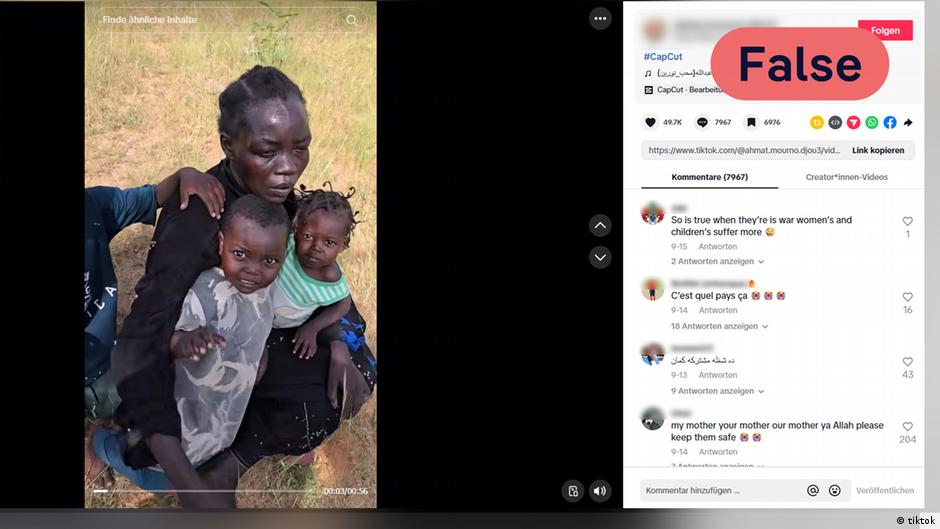When it comes to counting the number of victims in Sudan’s brutal civil war, accurate figures are difficult to come by.
But whether 20,000, 150,000 or even 200,000 people have been killed since the conflict began in April 2023, it is clear that atrocities, including mass rape, have been committed on a large scale – particularly by the rebel paramilitary Rapid Support Forces (RSF), which has been accused of Genocide, ethnic cleansing and crimes against humanity By international actors, including the United Nations and the United States government.
As expected, social media is filled with content showing evidence of these atrocities. Sometimes, the content really is accurate. However, more often than not it is fake, misleading and artificially created content abounds.
“This war is also going on extensively on social media, where propaganda is being spread on a large scale,” explains volker perthesFormer Special Representative of the United Nations Secretary-General for Sudan from 2021-2023.
“It depends on which side different activists are on, whether they blame the war and various massacres on the opposing side – or the US or the UN,” he told DW. “It’s all so hateful.”
Claim: “This video shows UAE-backed RSF terrorizing a mother and her children in Sudan.”
Verdict: Wrong
In late October, a viral video claimed to show a Sudanese mother and her three children cowering in front of RSF soldiers who, as reported in several social media posts, were firing their weapons at or near her, causing the woman to writhe in fear.
On October 29, an account on X that describes itself as an “independent analyst” of geopolitics, international affairs and breaking news posted videoWhich said that “UAE-backed RSF is terrorizing a mother and her children in Sudan.” The video has since been viewed nearly 13 million times, liked over 80,000 times and reposted over 41,000 times.
Same video was there on 30th October included in a post Description of atrocities allegedly committed by the RSF in the fall of the town of el-Fashar and its aftermath.
One insert reads, “A Sudanese woman and her children are being threatened with death by the UAE-backed Rapid Support Forces (RSF) militia.” The post has been viewed nearly 30,000 times.
On October 31, the video was picked up by prominent Syrian internet personalities Jamil Al-Hassan Who embedded it in one of his videos which he Posted on my Instagram channel (where he has over 2.4 million followers and where the video received approximately 450,000 likes) and his X account (where he has almost 400,000 followers and where the video has been viewed almost a million times).
“Save our people in Sudan’s fracas, be their loudest voice,” he wrote on each platform. In the version of the video included in her petition, a caption in Arabic reads: “The mother was trying to carry [protect] Her child.” In the five-minute long petition, al-Hassan claimed several times without evidence that the woman in the video was ultimately murdered.
Ultimately, later on October 31, al-Hassan’s video, which also included an embedded video of the Sudanese mother, was released. Further shared by an X account Describing itself as an “alternative news agency” where it garnered another 800,000 views.
However, the initial video does not show what the different accounts say.
Reverse image search of several screenshots of the video shows that it was Originally posted on TikTok on September 12 – more than a month before the capture of el-Fashar by RSF and therefore contrary to the story presented by at least two of the accounts that reposted it.
Additionally, local language experts from DW’s Arabic desk have confirmed some of the dialogue heard in the video, indicating that the men are not members of the RSF, but of the Sudanese Armed Forces (SAF). It appears that they are not threatening the woman, but asking her where she is from and whether she is associated with RSF. The woman replies that she is part of the Zaghawa tribe and that the RSF has arrested her husband.
Although she initially appears frightened by the sound of gunfire, the bullets appear not to be from close, but from a distance, and are not directed at her. What’s more, about 25 seconds into the video, an adult hand appears from behind the camera and briefly grabs the little boy’s hand in a way that seems more comforting than threatening. Actually, from this point the mother seems a little calmer.
The claim that the woman and her children were later murdered is baseless and impossible to prove.
In the video posted by Syrian commentator al-Hassan, footage of the woman and her children is not the only embedded clip; Al-Hassan also comments on a second clip showing a woman holding a small child and crouching in a desert ditch in front of two armed soldiers, depicted as shadows from behind the camera.
Reverse image search for screenshots of the clip shows that this motif has been posted hundreds of times on various social media platforms over the past week, including Here (almost 150,000 views) and Here (viewed over 12,000 times).
However, this clip is completely fake and created using artificial intelligence.
Not only do the soldiers’ “shadows” not move, but the color of the boy’s trousers also changes slightly. And if those clues weren’t obvious enough, the clip also includes the creator’s watermark: @khoubaib.bz, which has an Instagram account khoubaib ben ziouA self-described “creative AI expert.”
ben ziyu Clip posted on October 28 With an explicit comment that it was “AI generated”, but that didn’t stop it from earning nearly 110,000 likes or stopping Al-Hassan from using it in his videos.
Sudan: disinformation and fake news
DW asked both Jamil al-Hassan and Khubaib Ben Jiu whether they were aware that they were spreading false and AI-generated content, or that their AI content was spread as something real. DW also asked what his motivation was, but received no answer.
“Disinformation is a big problem in Sudan,” says gerrit kurtza conflict researcher at the German Institute for International and Security Affairs (SWP) in Berlin, with a special focus on the Horn of Africa. “Media literacy is not particularly high. On the other hand, availability of social media and internet in rural areas is limited.”
The disinformation coming from Sudan appears to be aimed more at the outside world, where many foreign powers have stakes in the strategically located and mineral-rich country.
“There are close personal relationships between the RSF leadership and the political leaders of the United Arab Emirates (UAE),” explains Kurtz.
“The warring parties are constantly posting their narratives on their respective channels. Telegram is popular, Hemedti [RSF General Mohamed Hamdan Dagalo] is on [US President Donald Trump’s] Truth Social, SAF and their partners are on Facebook and X.”
But while the propaganda battle is going on online, common people on the ground are suffering in real life.
DW Arabic’s Imad Hasan contributed to this fact check.
Edited by C. Bleiker






Leave a Reply